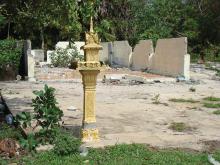Land Library
Welcome to the Land Portal Library. Explore our vast collection of open-access resources (over 74,000) including reports, journal articles, research papers, peer-reviewed publications, legal documents, videos and much more.
/ library resources
Showing items 1 through 9 of 33.The Marsabit Forest Reserve (MFR), a green island in an arid environmental setting, generates multiple ecosystem goods and services (ES) to the local community critical for their livelihoods.
Vihiga is one of the most densely populated counties in Kenya with a current population density of 1,045 persons per square km. The high population has exerted enormous pressure on available land resource resulting in land fragmentation and uneconomic subdivision.
Kenya has a wealth of wetland ecosystems that support diverse and unique habitats.
The land reform process in Cambodia is full of examples of injustice and human rights violations. Promises to improve the situation of the landless and land-poor citizens have remained unfulfilled. Development co-operation efforts have not changed this either.
Aquaculture holds a big potential to satisfy the growing demand for aquatic food. Setting out from lessons learnt in past development projects, our author describes what fish farming systems must look like to fit the needs of smallholders and the environment.
During the last few years, the donor community has increased its efforts to reduce the large amounts of fish lost in the distribution chain in artisanal fishery, an endeavour that ought to be welcomed in principle.
In September 2015, the Sustainable Development Goals (SDGs) are to be adopted in the context of the Post-2015 Agenda. In what way do the SDGs differ from the Millennium Development Goals? What does the community of states expect from their introduction?
The demand to eradicate extreme poverty and hunger has been the centrepiece of the Millennium Development Goals; the first MDG stands for the inextricable link between poverty and people’s ability to access safe, nutritious and sufficient food.
The sustainable management of soils is crucial to achieving the Sustainable Development Goals. This is evidenced by the analysis of the role soils play across the proposed agenda. However, some key aspects have not been sufficiently considered so far.








